 |
 |
 |
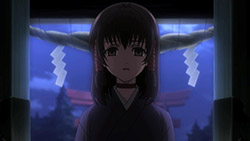 |
 |
 |
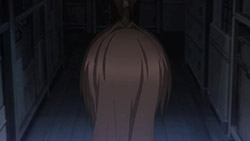 |
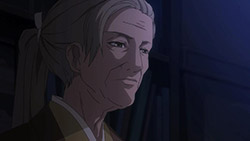 |
 |
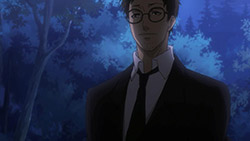 |
 |
 |
 |
 |
 |
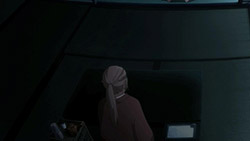 |
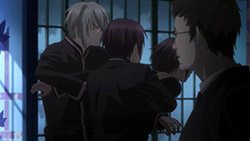 |
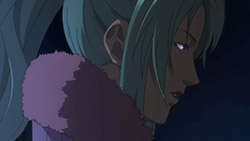 |
 |
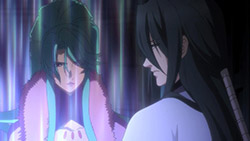 |
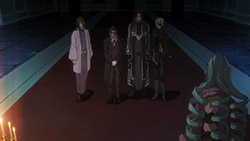 |
 |
 |
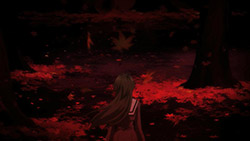 |
 |
 |
 |
 |
 |
 |
 |
 |
 |
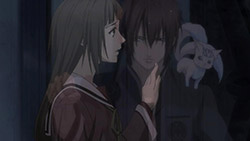 |
 |
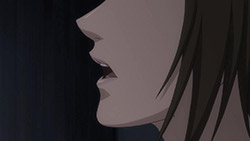 |
「夢の記憶」 (Yume no Kioku)
“Memories of a Dream”
How about we take the route where we don’t sacrifice anybody, Grandma? I seriously busted a gut when she declared she was going to follow Tamaki in death because really? That’s your brilliant solution? Not only is that incredibly strange, it’s highly irresponsible and incomprehensible. It’s one thing to keep yourself “clean” by forcing another person to do the dirty work, but escaping that responsibility by death showcases logic that’s operating on a different plane entirely.
Her willingness to sacrifice Tamaki – her own flesh and blood – shows devotion to tradition, but it also shows a startling disregard for human life. It was evident from previous episodes Grandma cared very little for strangers’ lives, but to see it extend to her own family is a little disconcerting. I suppose it stems from a combination of a cynical outlook and that classic mentality present in most traitorous characters: “I came this far, and I can’t turn back anymore”. It’s much akin to continuous lying, where one lie perpetuates another – soon enough everything snowballs out of control and it’s impossible to find the truth hidden underneath all the lies. Grandma has a habit of jumping to the worst possible conclusion and fixating on it, building all countermeasures to fit that extremity. What may have started as an unconscious rejection of all other possible methods have now become a willingness to throw away everything else for that one outcome she believes is befitting of all the sins she has committed. It’s no longer about sealing the Onikirimaru and keeping the world’s balance in check. It’s clear now Grandma is desperate to find any means of vindicating herself from the weight of her guilt. Is it tragic in a way? Yes, but it doesn’t make it right.
Mahiro presents another case of tragedy – knowing what he was told from his childhood, all the dreams he’s had suddenly seems all too heartwrenching. The knowledge of one’s death is a difficult burden to bear, but it’s doubly frustrating when the same person knows all too well they can never fulfill any of their hopes and dreams. I’ve always found this aspect of the guardians the best aspect to explore their characters from, since they’re all individuals whose personal wishes have never been regarded with a second thought – fixed to one fate all their lives, it was interesting how their desires clashed with what their duties demanded of them. For Takuma, the high point of his character was when he dealt with the prospect of being the demon that would eventually destroy everything – it was intriguing seeing how that knowledge shaped him. For Shinji, it was the desire to attain a sense of belonging and normalcy by whatever means possible that added complexity to his character. For Mahiro, it’s his unyielding sense of friendship and optimism that defines him, and it’s simply amazing how he has been able to upkeep such an energetic personality despite knowing what awaited him. In retrospect it gives double meaning to his vivacity – more than anyone else in the group, Mahiro knew exactly how limited his life could be, so he lived big yet his dreams were painfully simple.
His desire to die in Tamaki’s place is also touching because it indirectly shows how much he cares for her. She has really integrated herself into all of their lives and while not immediately evident, she has impacted them and given them strength in one form or another. While it was nice to see the guardians give her the credit she deserves throughout the series via various gestures, Mahiro’s declaration takes the cake. It’s nobility at its best, forsaking his own happiness so she can have hers. It’s a gesture you just can’t beat, and it’s actions like these that stir up the worst cases of Second Lead Syndrome.
But at the end of the day, it’s Takuma that gets the girl and why? I think it’s a legitimate question to ask – fate and all that other junk aside, why does Takuma/Tamaki make sense? I point this out since one of the most blatant and mind-boggling tropes in Asian media (particularly K-dramas) is its obsession with the One True Pairing. Situations of the utmost contrivance are deliberately construed and presented to hammer in the fact These Two People Belong Together Forever, even if none of it makes any particular sense. Even the most unhealthiest relationships are touted as the Fated One, and it’s seriously one of the dumbest tropes out there. I always do prefer a defined pairing over the whole “will-they-won’t-they” debacle, but Asian media has a tendency of forcing the romance down the audience’s throat, bumbling unconfidently through the material rather than letting it run its course. The difference in Hiiro no Kakera is that the presentation of the relationship is slow, but natural.
It’s a combination of things that make this pairing work, but the best thing about them is the lack of contrivance in respect to their feelings. It progresses from A to B to C instead of jumping from A to Z simply because they’re the OTP. Not only do they see each other as equals, they’re both willing to be there for one another when it counts. Tamaki gave Takuma hope, and in turn, he gave her strength. Looking at the series as a whole, it makes perfect sense they’d fall for each other. As for why it had to be Takuma, despite some characteristics that obviously mark him as “the main guy”, that’s not really why he wins out. Despite his aloof nature, Takuma is quite proactive when it comes to Tamaki, and he has been there for her every time it counted. It’s that distinction that earns him the privilege of romance, and while I do love Mahiro to bits, in terms of the anime adaptation, Takuma is best person for Tamaki.
He brings out the best in her and inspires her to become better, but at the same time, he’s not quite the sole reason for her existence. She can certainly live quite well on her own and her desire to become stronger has existed well before her feelings for Takuma came to light – he just gave her an extra source of support. She does the same thing for him, and it’s lovely to see how positively she has influenced him. There’s no outstanding changes in their personalities – and there shouldn’t be, really – but it’s clear to see they’ve each helped the other person become better. They’re walking together side by side instead of one person walking ahead and the other trailing along.
I think what made Takuma coming back for Tamaki such a highlight is how simple and profound it is at the same time. It’s certainly not the “trade-your-life-for-mine” sort of gesture, but how powerful and difficult is showing the person you love they’re not alone? His direct and heartfelt words are just what Tamaki needs to snap her out of her doubts, and if she follows up that cliffhanger with something stupid, bitches will be slapped. The first time was okay since Grandma created all the confusion, but with Takuma stepping up his game with his heart on his sleeve, the words out of her mouth next week better be “I want you to be with me” or something to that effect. Otherwise, bitches. Will. Be. Slapped.
Note:
I’m really sorry for the tardiness of the post – I’ve been sick the past few days.
Full-length images: 1, 2, 3, 4, 5, 6, 7, 8, 9, 10, 12, 13, 15, 16, 18, 19, 21, 22, 23, 24, 25, 29, 32, Preview 01.
Preview
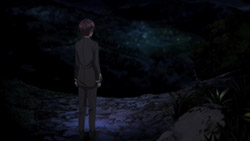 |
 |
 |

Mahiro screaming “kill me, kill me” was heartbreaking… 🙁
This is so true that it isn’t even funny- the number of K-dramas and T-dramas that blindly make use of it is innumerable- people are complex creatures, feelings aren’t so simple that they develop for no substantial reason besides the “god (writer)-ordained” fact that this is the “one true pairing.”
Which is the stuff that many real-life relationships are based off- it isn’t all that complicated; I don’t understand why Asian media tends to have such a hard time portraying it properly. One moment, please. Hmm…what’s this? Poked around the net a little and found a whole Wikipedia page about a Buddhist philosophical concept that probably explains Asian drama’s (blindly) deterministic interpretation of romance…talks about the karmic “fate and destiny” of lovers without even mentioning emotional/personality affinity…figures…explains why HK-dramas are a little better in general too; with Hong Kong being under British rule (and influence) for so long…
This show’s so fatalistic (Though I’d bet there’s a good chance that the ending is all about breaking out of fate). Kinda heart-wrenching sometimes, but it’s always interesting to see what the characters decide to do with the hand they’re dealt, whether it be crazy old Gran on a warpath, or the guardians with their apparently immutable fates. Ah well, I guess the Confucian concept of “Ming” is generally considered to be pretty fatalistic here in the West- an “invisible hand” that guides the plots of shows with heavy spiritual themes, I suppose…
My God I know – this is the reason why I stay away from K-dramas in general, especially ones with the “romance” genre slapped onto it.There are occasionally really, really good ones that manage to be bearable even with the whole pre-ordained lovestory, but sadly for most of them, once you’ve seen one you’ve… kind of seen them all lol.
Yeah fate plays a pretty important, but background (lol paradox?), role in the character’s lives. I like how it’s portrayed in Hiiro since it’s not too in your face, but viewers are still able to keep in mind the kind of upbringing these guardians have had and how it’s impacted them. Wish more shows would take the subtle approach.
Please repair the images for the previous episode.
Hi, and thanks for the recaps! It is always interesting to hear your opinions on the episode’s themes!
That said, I don’t quite understand Takuma’s position. Does it mean he is the actual demon from all those years ago, or is it just the demon’s power inherited through his family?
Also, is it just me, or do the government guy and the gray-haired guy(the one with Tamaki’s classmate)seem to be the most suspicious characters in the series so far? All they do is skulk around, keeping their ultimate agendas and ideas to themselves. It’s hardly sporting to not share information in an end of the world situation now, isn’t it?
Has anyone played the actual Hiiro game itself that gives any info on these character’s motivations and story?
Well the main couple is good and all. But I’m totally intrigued by Vier “confession” that she is a Homoculus made of Suguru’s mom. I hope they develop that side of the story since the Takuma X Tamaki ship is sealed.
-I’m glad you did manage to post-I have been looking forward to your posts on Hiiro no Kakera and I hope you are all better now.
-That cliffhanger is killing me =P and I am now very , very suspicious of Kiyono…
Who is Kiyono again? How is she suspicious?
Kiyono is Tamaki’s school friend…she was the one hanging around with Ryou in this episode.
A real episode. Thank god.
That aside, time for improbable behavior. Forgiving betrayal – they all seem ok with being betrayed… Not realistic. How about another – Mass murder… Oh, by the way, all those people that have gone missing, we’ve been killing them by making them suicide themselves into the lake. No one even bats an eye. I’m really really reeeeeeeeeeeeeally finding it hard to ignore certain things with this show. If you watch anime for a while you do learn that sometimes you just have to go with the flow and enjoy the anime. But this show has stretched me to my limits. Not just with them drawing the story out for a loooooooooooong time but for the behavior that doesn’t seem realistic.
Very touching and great episode. But, I still don’t get it. If Takuma’s actually the reincarination of the Underworld God, why did they call him an oni in the beginning?
Nobody knew the “real story” so to speak – everyone was under the assumption that the demon responsible for all the carnage was purely evil, when that wasn’t the case.